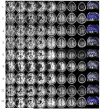The forgotten grammatical category: Adjective use in agrammatic aphasia
- PMID: 24882945
- PMCID: PMC4034142
- DOI: 10.1016/j.jneuroling.2014.04.001
The forgotten grammatical category: Adjective use in agrammatic aphasia
Abstract
Background: In contrast to nouns and verbs, the use of adjectives in agrammatic aphasia has not been systematically studied. However, because of the linguistic and psycholinguistic attributes of adjectives, some of which overlap with nouns and some with verbs, analysis of adjective production is important for testing theories of word class production deficits in agrammatism.
Aims: The objective of the current study was to compare adjective use in agrammatic and healthy individuals, focusing on three factors: overall adjective production rate, production of predicative and attributive adjectives, and production of adjectives with complex argument structure.
Method & procedures: Narratives elicited from 14 agrammatic and 14 control participants were coded for open class grammatical category production (i.e., nouns, verbs, adjectives), with each adjective also coded for its syntactic environment (attributive/predicative) and argument structure.
Outcomes & results: Overall, agrammatic speakers used adjectives in proportions similar to that of cognitively healthy speakers. However, they exhibited a greater proportion of predicative adjectives and a lesser proportion of attributive adjectives, compared to controls. Additionally, agrammatic participants produced adjectives with less complex argument structure than controls.
Conclusions: The overall normal-like frequency of adjectives produced by agrammatic speakers suggests that agrammatism does not involve an inherent difficulty with adjectives as a word class or with predication, or that it entails a deficit in processing low imageability words. However, agrammatic individuals' reduced production of attributive adjectives and adjectives with complements extends previous findings of an adjunction deficit and of impairment in complex argument structure processing, respectively, to the adjectival domain. The results suggest that these deficits are not tied to a specific grammatical category.
Keywords: adjectives; adjunction; agrammatic aphasia; argument structure; grammatical categories; narrative speech.
Figures




References
-
- Alexiadou A. Adverb Placement: A Case Study in Antisymmetric Syntax. John Benjamins; Amsterdam/Philadelphia: 1997.
-
- Bedny M, Thompson-Schill SL. Neuroanatomically separable effects of imageability and grammatical class during single-word comprehension. Brain and Language. 2006;98:127–139. - PubMed
-
- Benson DF, Ardila A. Aphasia: A clinical perspective. Oxford University Press; New York, NY: 1996.
-
- Bernstein D. Essentials of Psychology. 5th edition Wadsworth, Cengage Learning; Belmont, CA: 2010.
-
- Binder JR, Westbury CF, McKiernan KA, Possing ET, Medler DA. Distinct brain systems for processing concrete and abstract concepts. Journal of Cognitive Neuroscience. 2005;17:905–917. - PubMed
Grants and funding
LinkOut - more resources
Full Text Sources
Other Literature Sources
